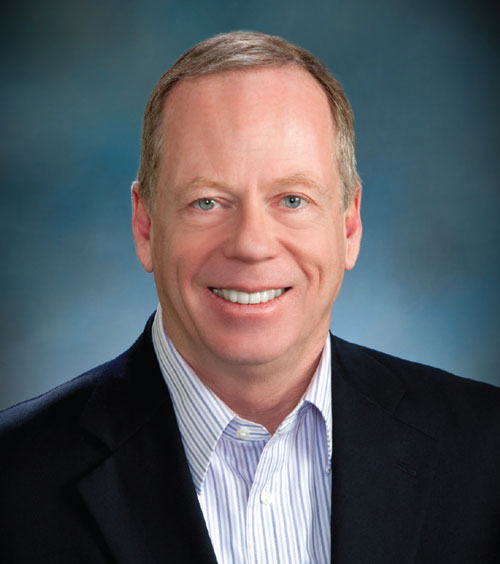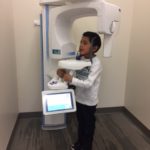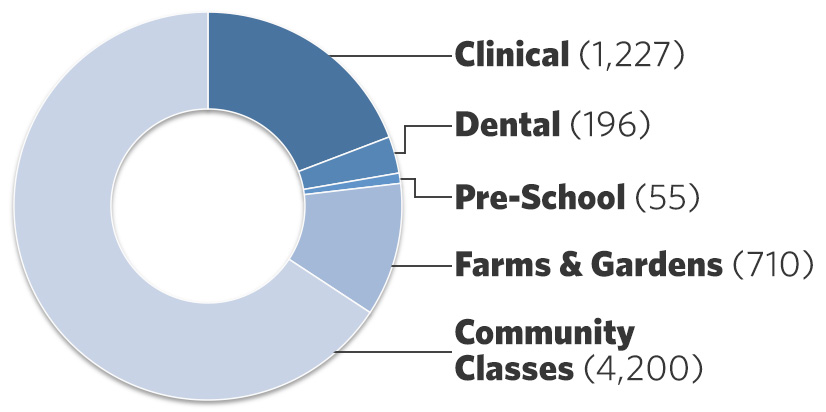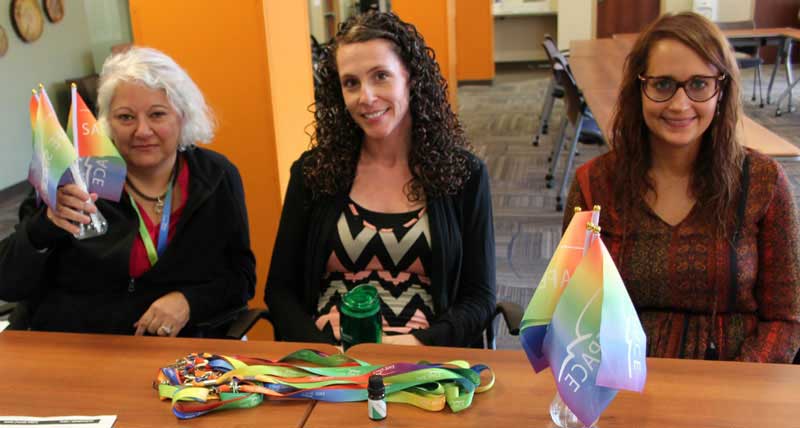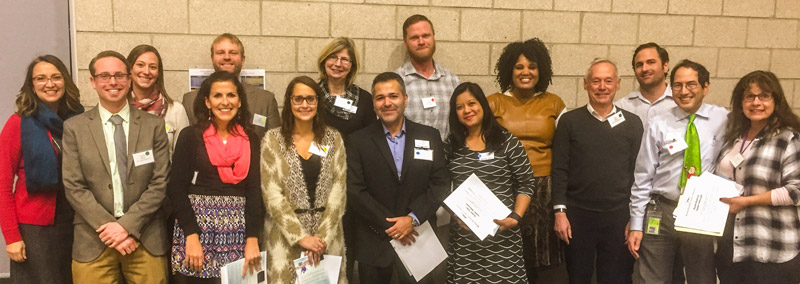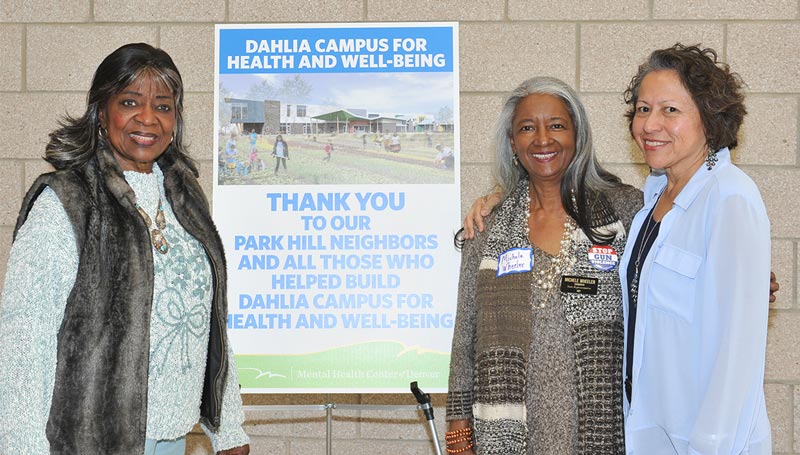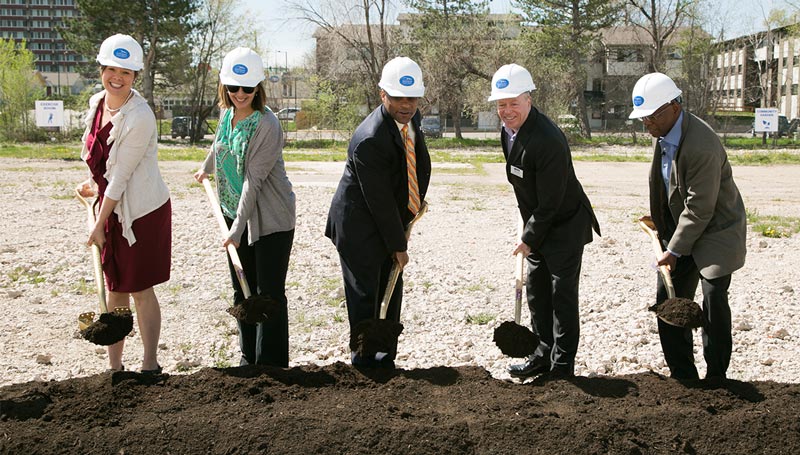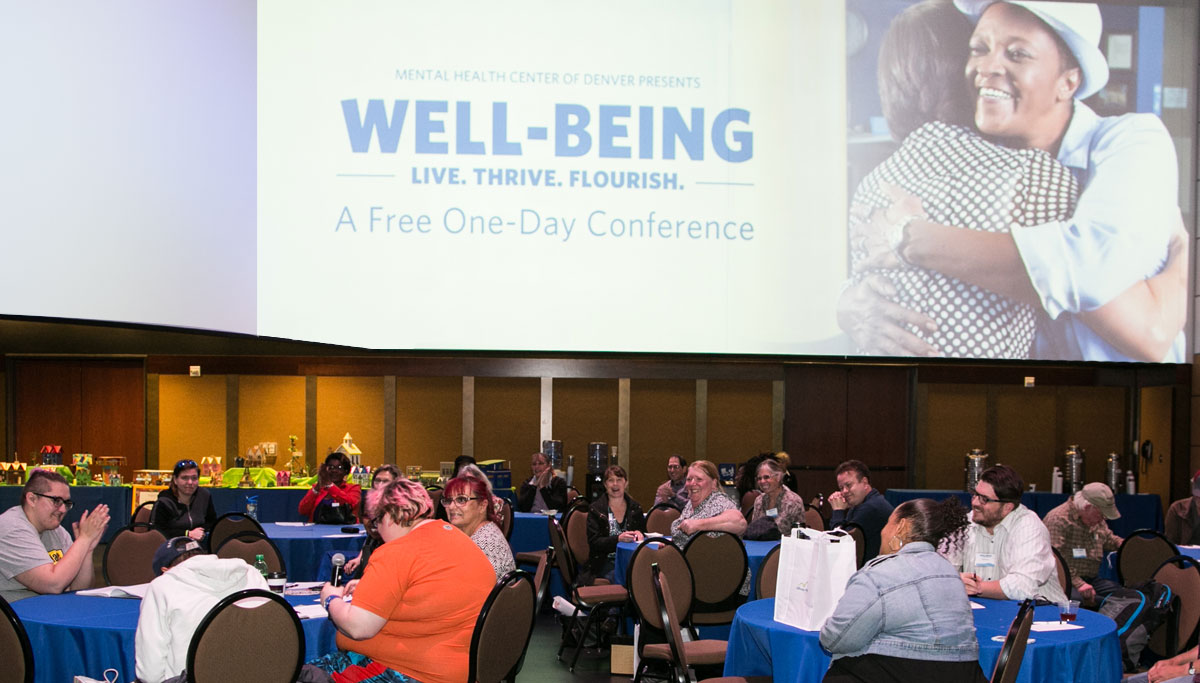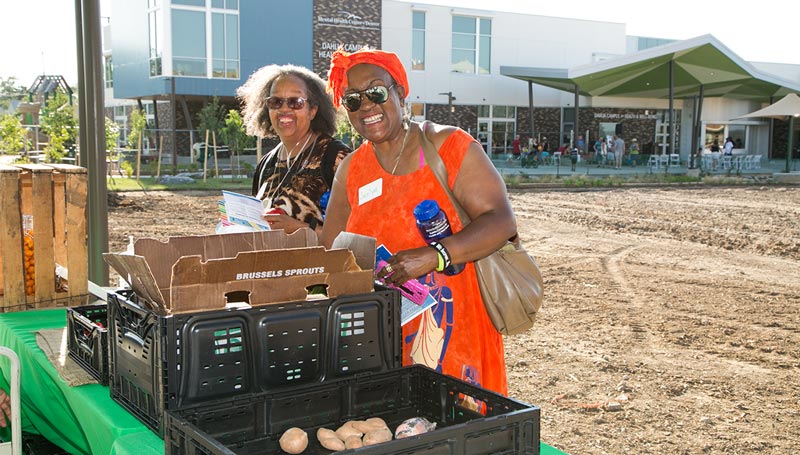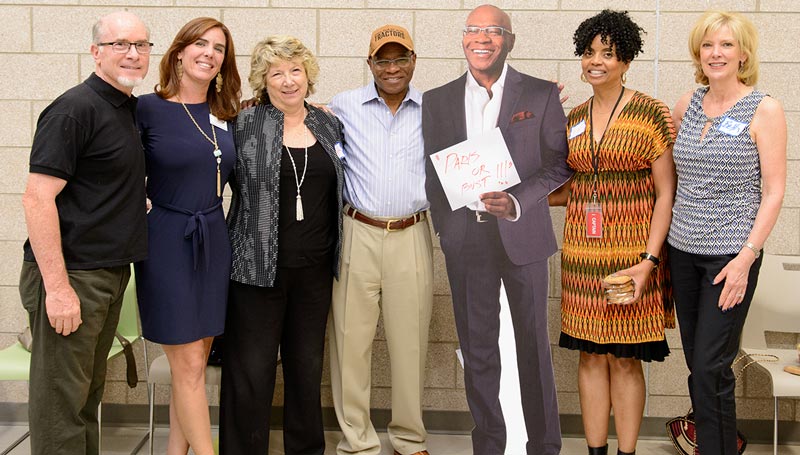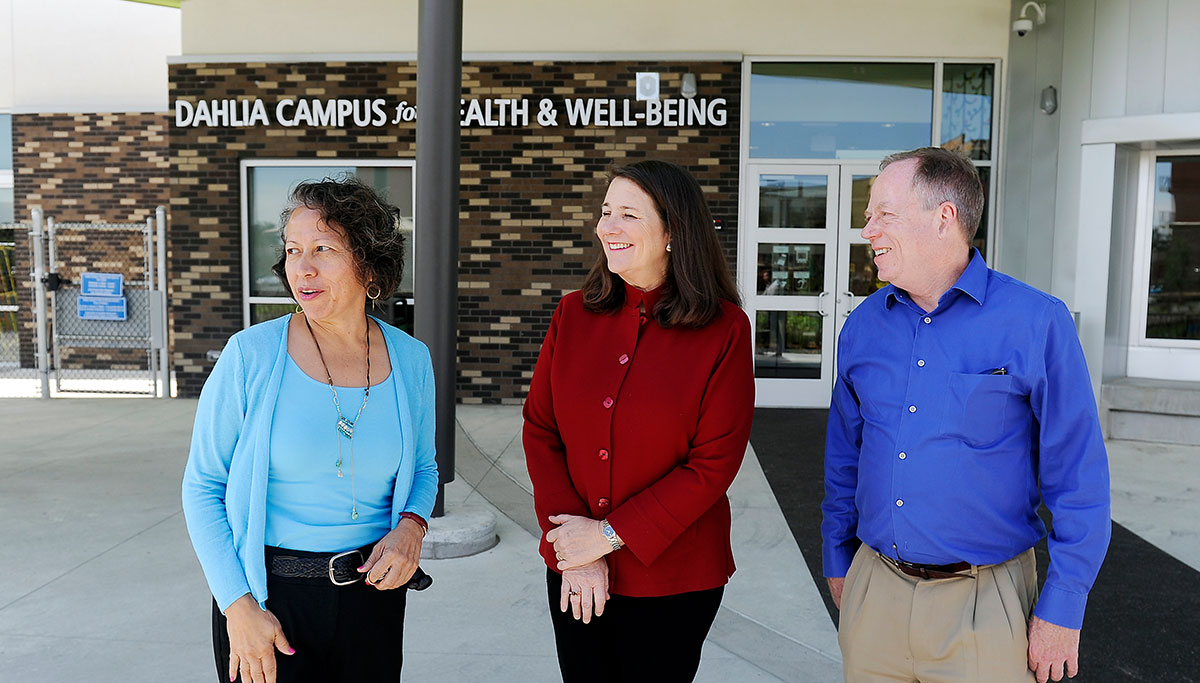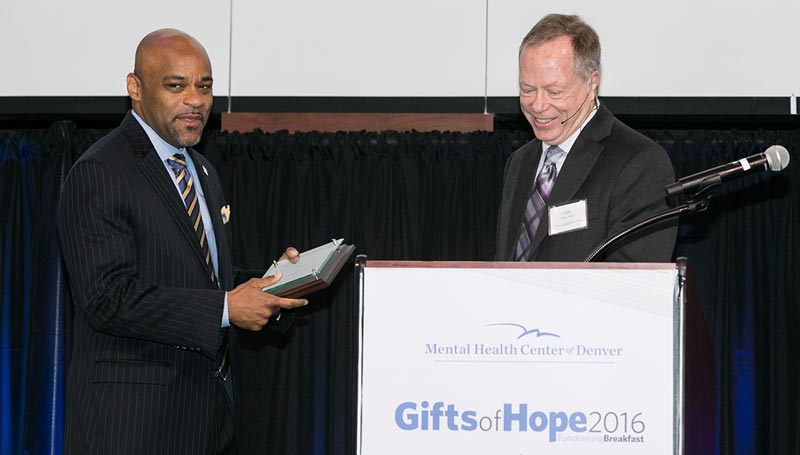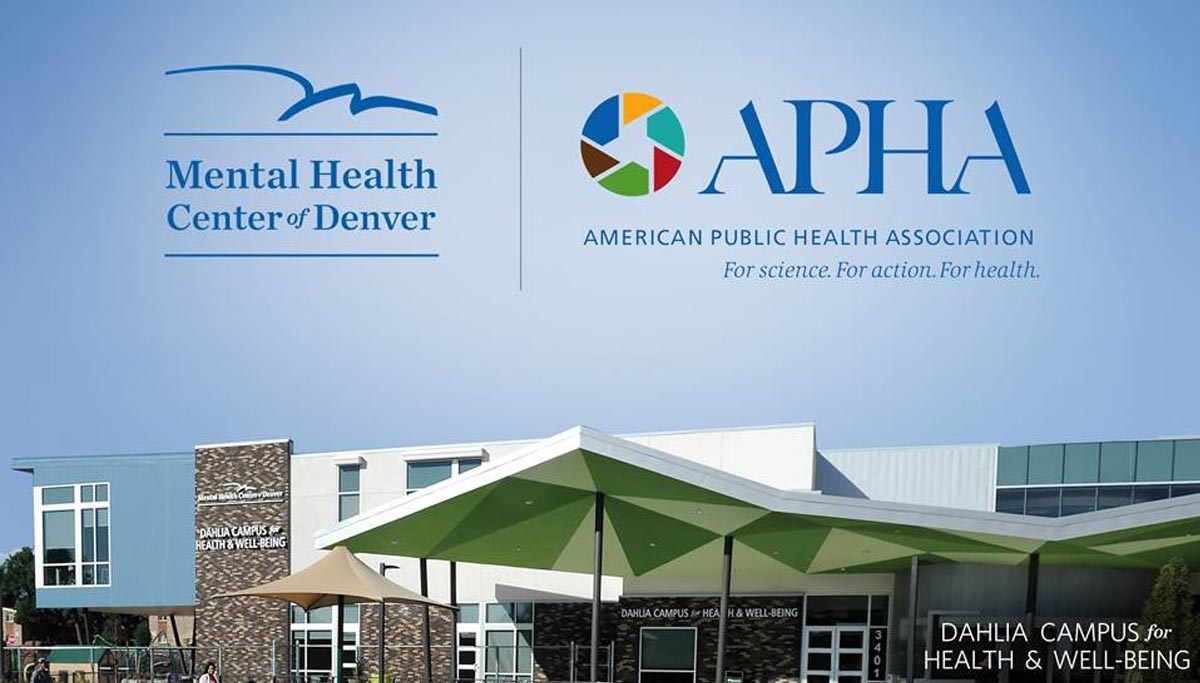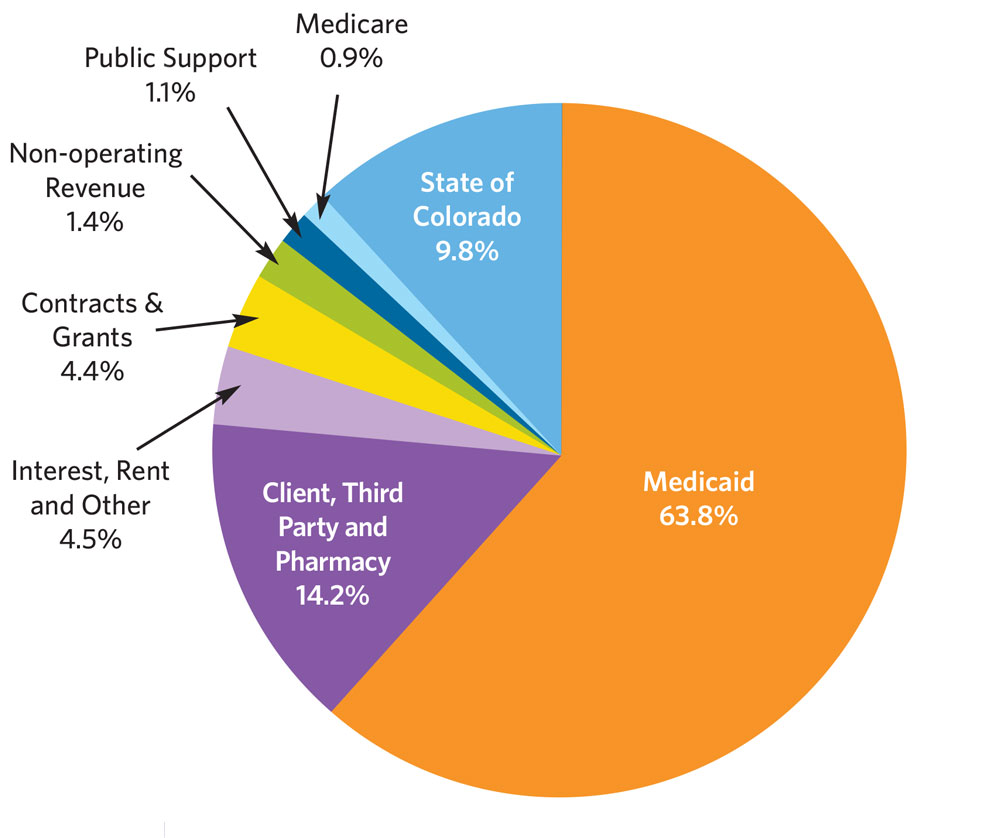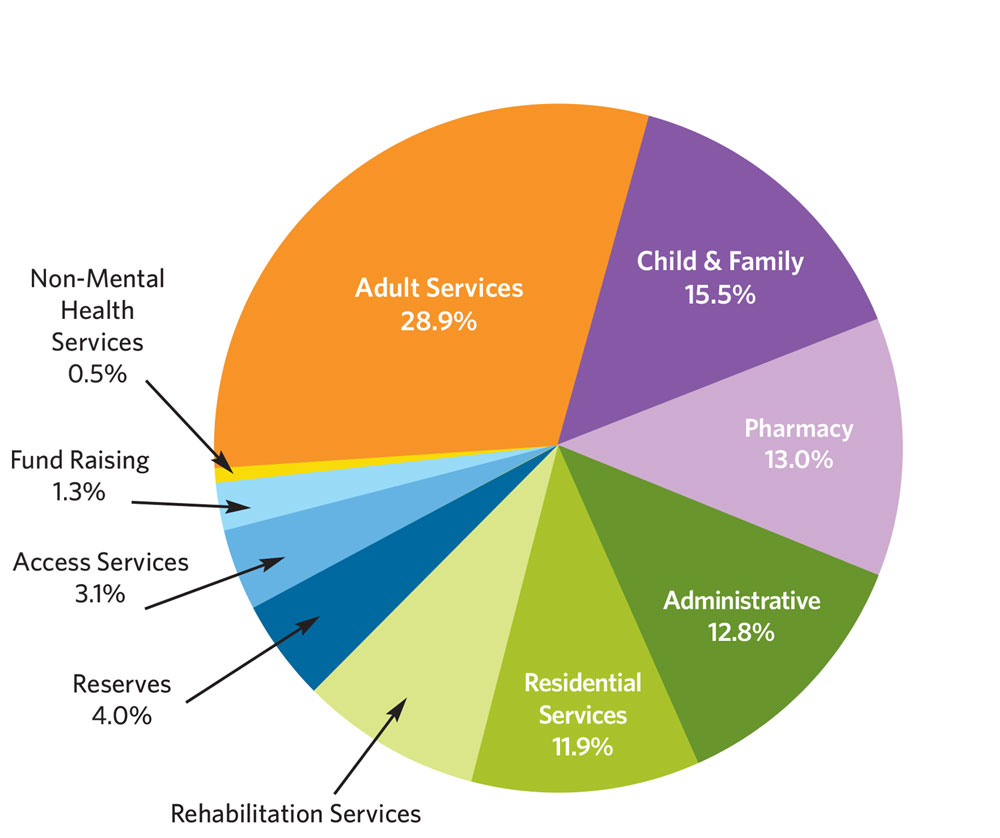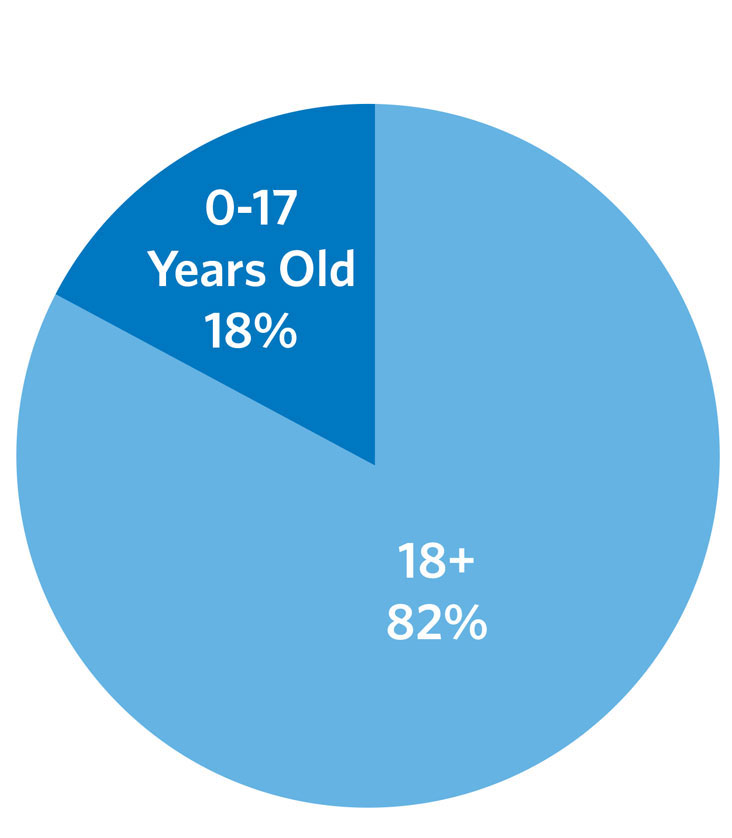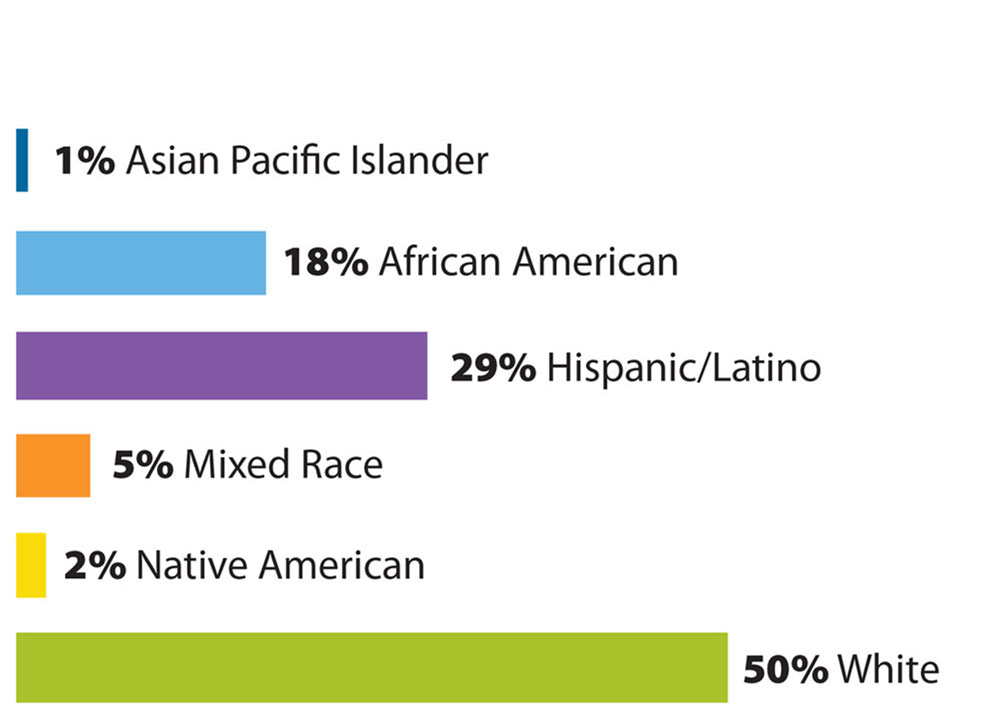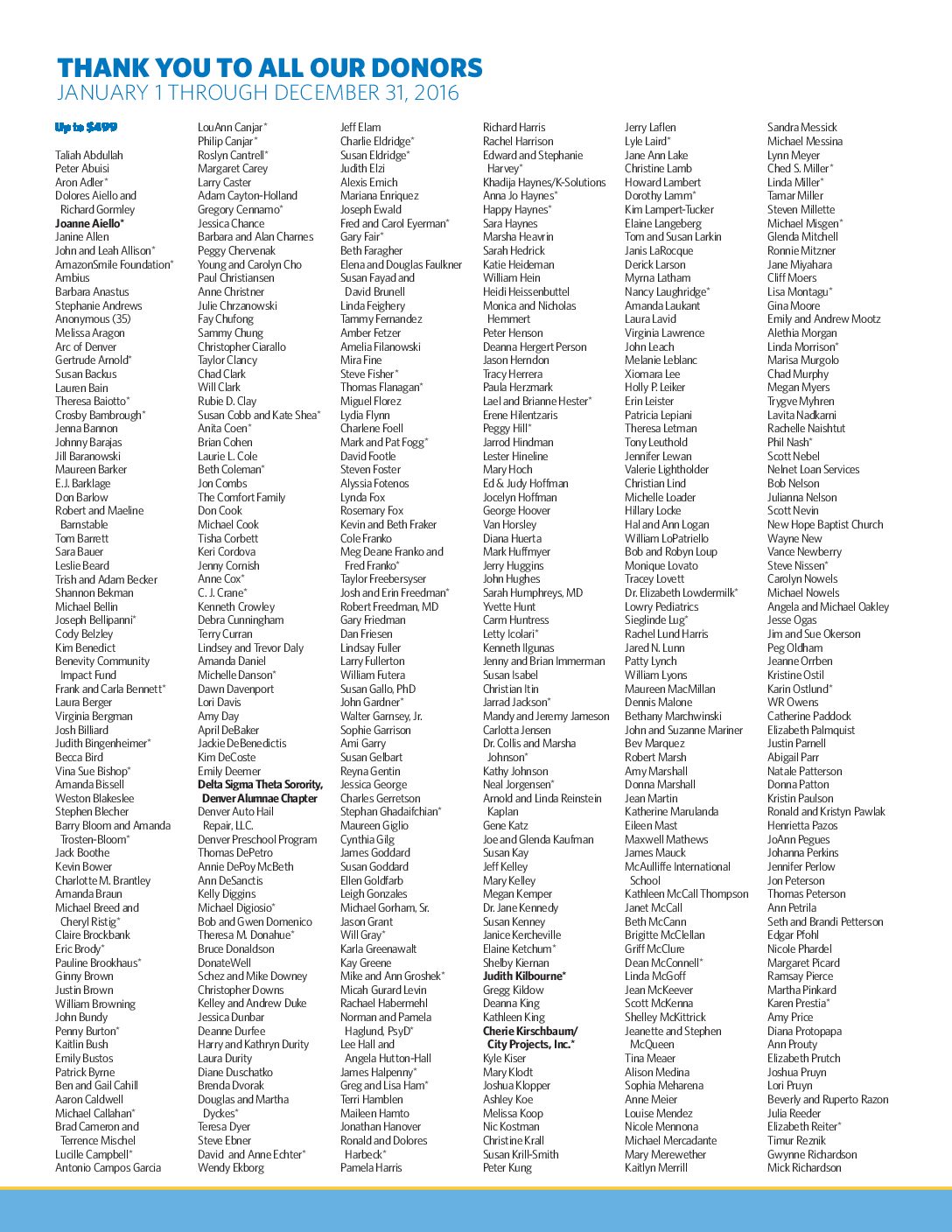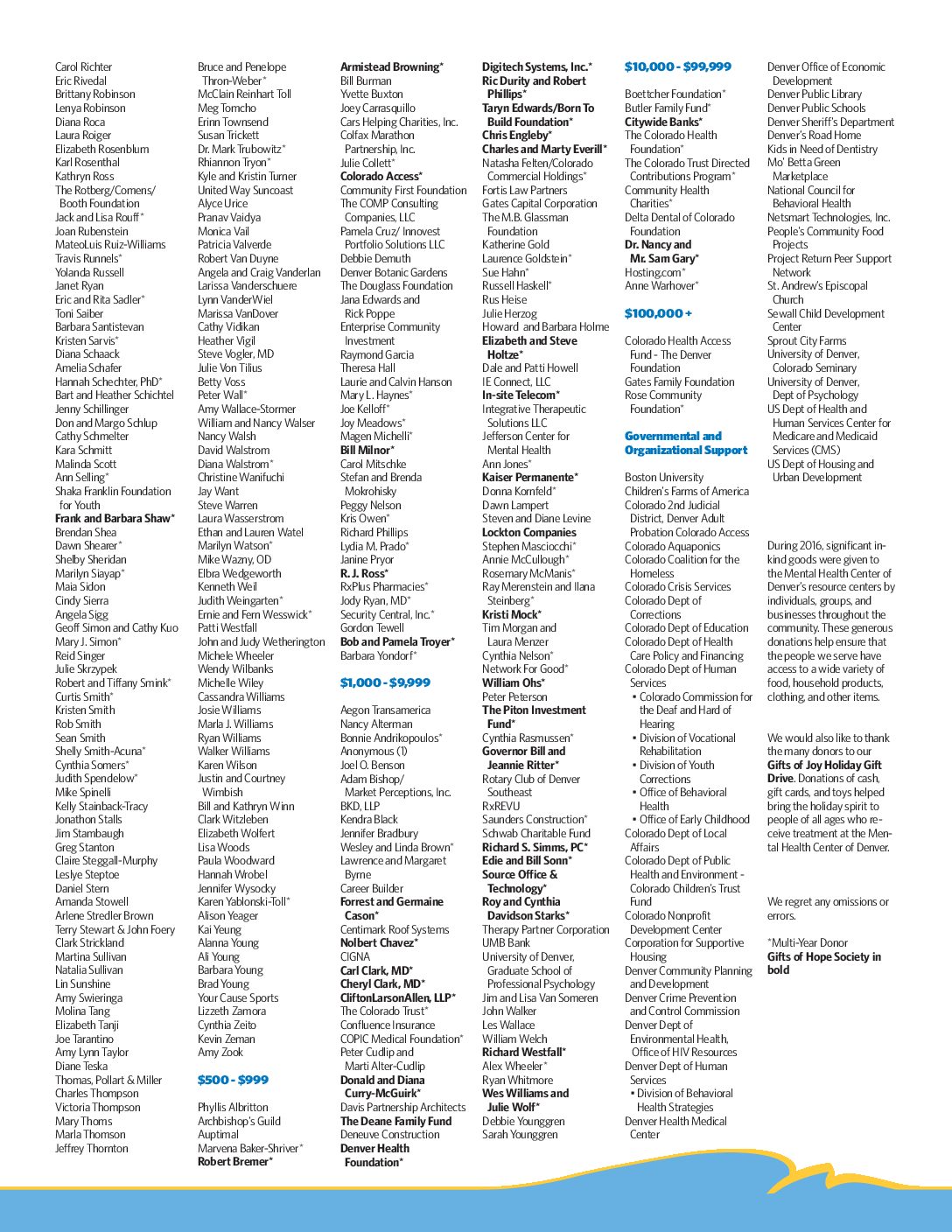Navigate the Report
Navigate the Report
Expanding the Community's Access to Care
Letter from the President & CEO
Expanding the Community's Access to Care
Letter from the President & CEO
This past year, we expanded services to meet people where they are. We know that people are more likely to engage in services if we can meet them at a place that they are already going to in our community. By partnering with community organizations, we are able to strengthen our community’s well-being, remove barriers and expand access to care.
The high point this year was the opening of our Dahlia Campus for Health & Well-Being. Receiving national attention for going beyond therapeutic services, this innovative approach engaged the community to create a place for people to come together, learn new skills and find supports. We believe everyone is interested in improving their well-being. Our Dahlia Campus allows us to open our doors wider to support well-being for all through community partnerships that provide access to healthy food, dental care, preschool and healthy living classes.
Mental health is health. Being able to get all your health needs met in one convenient, familiar setting is optimal. We have been on the forefront of integrated care and continue to expand our program beyond our walls to seamlessly integrate behavioral health into primary care doctors’ offices. Treating the whole individual results in better satisfaction and earlier diagnosis and treatment.
Our new co-responder program is a partnership with Denver Police and Denver Human Service’s Office of Behavioral Health Strategies. A licensed clinician and a police officer respond on crisis calls together.
The co-responder program allows us to help people experiencing a crisis get into treatment or connected to resources and diverts them from deeper involvement with the criminal justice system. With this endeavor, we now have intercepts in place throughout the criminal justice system – police, mental health courts, jails, re-entry programs and community supports for parolees – to better address the mental health needs of those in the system.
We continue to have a deep focus on well-being for our staff and community. The science of well-being has shown that a person’s positive well-being has a ripple effect on family members, colleagues and the surrounding community. We’ve intentionally created a culture of well-being for our employees that supports a safe and inclusive environment, provides opportunities for growth and focuses on strengths. This, in turn, allows our employees to have a positive impact on those we serve. For four years in a row, our employees have validated our efforts by providing feedback that has ranked us as a Top Workplace by The Denver Post.
In this uncertain healthcare environment, we will continue to focus on strengthening our community’s well-being. We will advocate for access to mental health services and take proactive steps to avoid slipping backward. Right now in our nation only two out of five people who would benefit from mental health treatment have access to care. We will continue to expand our services and grow capacity by using innovative technological advancements and new models of care delivery.
![]()
WellPower’s Dahlia Campus for Health & Well-Being is founded on principles of partnership: If whole health includes attention to mind, body, nutrition, education and oral health care, then a community needs an intentional gathering of partners from each of those fields.
And nearly every day, Lydia Prado, PhD, vice president of Child and Family Services, is reminded of the most important Dahlia Campus partner of all – the neighborhood itself. As the primary architect of Dahlia Campus’ integrated services and community activities, Dr. Prado fielded intense requests, desires, objections and opinions at every step of the way. Now, a year after opening, Dr. Prado credits that trial by fire and connections with community champions as the forging of the key neighborhood partnerships.
“One of the neighborhood elders recently pulled me aside,” Dr. Prado said. They had tangled – respectfully, but memorably – over community desires and realistic solutions. “What I want you to know,” this elder told her, “is that this campus is beyond what I could have imagined. It is big and beautiful and welcoming. This is exactly what we need and what our little ones deserve. I tell everyone they need to get over here.” This woman is now not just a partner, Dr. Prado said, but an ambassador to every other neighbor. “It really speaks to me about the power of place that is owned by the people who live here.”
Dahlia Campus partners are still learning how to be the best possible resource for northeast Denver. With the emphatic advice of neighbors, an early childhood education center, a dental clinic and community gardens as well as community kitchen were layered with the original concept of a community-based mental health site. The rejuvenated space at 35th Avenue and Dahlia Street buzzes much of the day with children on playgrounds, urban farmers tending herbs and live fish in the aquaponics greenhouse, dentists consulting with students and senior Zumba classes.
There are further steps to take to welcome the community and let them know Dahlia Campus was designed with their input, said Dr. Prado and other partners.
“It’s always a challenge to open a new clinic and build up a patient base,” said Julie Collett, RDH, executive director of Kids in Need of Dentistry (KIND), the not-for-profit dental clinic with a new branch at Dahlia Campus. “But with Dahlia, another challenge is nobody’s expecting a dental clinic in there.” One solution will be as simple as adding new signage on the outside and reaching out to other community partners. Denver Public Schools (DPS) will be adding to the oral care partnership in 2017 by providing funding for any DPS students needing dental care. Those students will be able to receive dental care at the Dahlia Campus and other KIND locations for free.
The Sewall Child Development Center partners like to talk of Dahlia Campus the way they would a classroom. “There’s a term in early childhood called ‘parallel play,’” said President and CEO Heidi Heissenbuttel, MA, ECSE, referring to the healthy practice of kids playing alongside each other without direct interactions. “I think the first year at Dahlia, we were co-located, doing parallel play. Now we’ve learned we’ll do even better coming at this program and our funding by partnering together.”
By seeking shared philanthropy funding with the WellPower, the partners can now fund a therapist who works directly with families of children with toxic stress or special needs enrolled at the Sewall preschool on Dahlia Campus. The preschool families are quickly finding other Dahlia Campus opportunities, from weekend food backpacks for families in need to garden access, Heissenbuttel said. “If you moved those programs off the campus, you’d lose all those families. It’s the central navigating point, for sure.”
Learn more about how to get involved at Dahlia Campus through volunteerism, taking a tour or becoming a donor.
Denver Police Officer Steve Hammack and WellPower Program Manager Chris Richardson walk the 16th Street Mall in Downtown Denver.
A mental health clinician, a paramedic and a policeman bicycled onto the South Platte River Trail. It could be the beginning of an old joke. Instead, it’s an acclaimed new program to keep people with mental illness out of jail.
What happened next wasn’t a punch line, but the creation of a groundbreaking “Co-responder” program. Aimed at diverting those in a mental health crisis from the usual unhelpful place -- city jail -- the co-responder team pairs our staff clinicians with Denver Police in patrol cars, walking the streets and yes, bicycling downtown paths. And it’s working.
From just April through December of 2016, co-responders answered 1,106 calls of someone with a mental or behavioral health crisis, and 1,043 of those people went to treatment or other services instead of straight to jail. When they leave the patrol cars and take bicycle shifts along the South Platte and other city trails, the co-responders can add in proactive services: making contact with the homeless or others in need who tend to hang out outdoors and don’t know where to reach aid.
The teams have been so successful that leaders plan to add more clinicians to expand the co-responder program in 2017.
“It’s an amazing opportunity,” said Heather Crawford, a Licensed Professional Counselor with WellPower and one of the regular rotators on the co-responding shifts with Denver Police Department.
“For us to be able to see the officers and how truly amazing they are day in and day out, how open they are to ‘let’s see what we can do and try something different for this person.’ The paramedics are incredible, too. And it’s a great opportunity to have the community help people get to the best quality of life they can.”
The responders are the result of a partnership between Denver Human Services’ Office of Behavioral Health Strategies, the Denver Police and the WellPower. The program started with three co-responders in April, and now has six mental health providers going out with police and, when necessary, paramedics.
The goal is “trying to change the default mode of the system in response to mental health calls,” said Chris Richardson, LCSW, WellPower program manager for the co-responders. “It’s about getting people in crisis to someplace that isn’t jail; but also helping them find a long-term option that will avoid a future crisis involving the police."
Many people in crisis call 911, or their neighbors or passers-by do, because it’s the only number they know. The responders bring along resources and strategies to contact anyone from Colorado Coalition for the Homeless to shelters, food banks, or private counseling options to meet the needs of the person in crisis.
What’s been great to watch, said Denver Police Sgt. Michelle Folmar, is how quickly the officers and the counselors adapted to each other and came to rely on each other. Dispatchers now know to seek out the patrol cars with the counselors for many calls; officers responding alone are calling out for backup from co-responder teams to give more effective service.
Co-Responders Work Closely with Denver Police
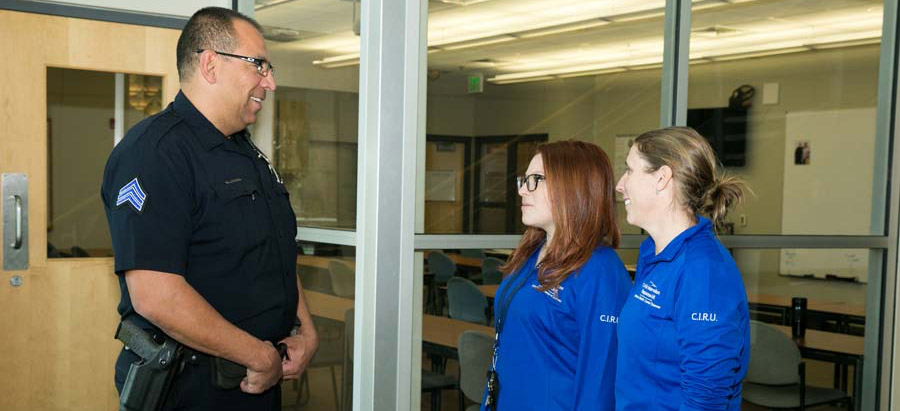
Individuals were contacted by the co-responder team
Of people went to treatment or services instead of jail
Now officers on the over-night shifts are passing along names of people they’ve contacted on the late shift who they believe could use counseling or information.
The program “fits like a glove” with many police actions that often resemble social work in the community, Folmar said. Officers had seen too many familiar residents who called dozens of times a year.
“They felt frustration that the calls would keep coming, the person would get no real sustainable resources and highly likely to be victimized by someone else. Community resources would be ineffective over and over again,” Folmar said. “This program changes that. It doesn’t end the calls. But now they see those calls decreasing significantly. The people are getting the counseling and help, and hopefully keeping their lives and family together.”
Would you like someone from the Co-Responder Program to speak to your organization or business?
Dr. Scott Merenstein and Dr. Brigitte McClellan, behavioral health consultant, are part of the integrated care team at Lowry Pediatrics.
Care doesn’t get much more integrated than knocking down closet walls and seating primary care doctors right where you used to keep the brooms, coffee filters and extra pens.
The WellPower has been serious about bringing together all forms of physical and behavioral care to those we serve since 2008, when shelving in a cramped building was torn down to create physician exam rooms.
Nine years after the first closet takeover, the WellPower is poised to sharply increase our stake in the now-proven concept of putting brain care and body care in one place for the benefit of those we serve. We are working with partners to identify up to six more primary care practices where demand for behavioral services is high enough to add one of our behavioral health consultants on site.
That would deepen a commitment that already integrates care at seven locations: A primary care clinic at our adult Recovery Center, and behavioral providers embedded at six independent primary care practices across Denver. Even as the network grows more complex, said Dr. Cheryl Clark, vice president and chief clinical and chief medical officer, the grounding philosophy remains as simple as ever. “The brain is inside the body. We think it’s important to treat the most important organ in the body,” Dr. Clark said.
Promoting integrated care is a realization that those we serve encounter barriers in many places.
People with significant mental illnesses or behavioral issues often have multiple untreated physical ailments they’ve never addressed. Some primary care practices didn’t know how to handle such patients and realized additional supports were needed to handle them. Meanwhile, primary care patients with behavioral needs rarely take the extra step of finding a mental health provider off-site. And some primary practitioners would avoid asking mental health questions because they had no resources to address what came up, noted Orlando Padilla, WellPower’s associate director of Integrated Care Services.
Practitioners at integrated sites are now “happy to have someone to hand-off to,” Padilla said. “The more we go on, the more we hear the practices can’t see themselves operating without it.”
Dr. Scott Merenstein at Lowry Pediatrics is one of those who makes some of those “warm hand-offs” to mental health providers – often in the middle of an exam. WellPower’s Behavioral Health Consultant Brigitte McClellan, PsyD, flows seamlessly in and out of appointments to consult on everything from teens with active suicide plans to families in a food-shortage crisis, Dr. Merenstein said.
Addressing Health Needs in One Place
Individuals Served Through the Integrated Care Program in 2016
Most importantly, he said, Dr. McClellan and other embedded mental health providers like her come in with a concrete plan: An appointment for an Attention Deficit Disorder evaluation, or the address of an open food shelf on the patient’s way home.
After a year and a half of closely integrating care, Dr. Merenstein’s message for his colleagues at other family clinics is adamant: “If you don’t have it, you need it. I can’t imagine not having it now, it’s become such a central part of our practice.”
Mental health leaders are adapting the system while it is being built. Billing for integrated services is still a challenge, and “we need a mechanism for payment reform,” Dr. Clark said. Since many adult patients with new Medicaid coverage are “playing catch up” on a lifetime of health issues, integrated care must start pushing earlier interventions for hazards like alcohol use and smoking.
If it ever seems too complicated or daunting, Padilla just compares the challenge at hand to the basic tenet of integrating care: “Patient-driven care that provides the right service at the right time. ”
Your support makes a difference in supporting integrated care across the city of Denver.
A workplace that is a kaleidoscope. And not a melting pot.
A passion for identifying natural talents and abilities and developing them into strengths.
A culture where everyone is invited to grow.
Those are the ways the WellPower employees speak of their workplace, the best evidence that heartfelt principles of diversity, inclusiveness and advancement are honored every day. We focus on the individual strengths and goals of our employees and are deeply invested in the concept that the way employees are treated reflects how those we serve should be treated.
“Our focus on diversity and inclusiveness is both internal and external,” said Leslye Steptoe, PhD, vice president of Diversity & Inclusiveness. “We want staff and people we serve to feel valued, to be seen and heard, and we’re always working on how to do that better.”
“We do a lot more than stick words up on the wall and see what happens,” said Jeff Tucker, vice president of Human Resources. Tucker’s favorite example is a comment from a recent hire. “They said, ‘I worked at a 300-employee place for three years and never once met the CEO. I’ve worked here for a month and a half, and I’ve met with the CEO and all your vice presidents, and there’s a chance to ask questions of every one of them.”
“We think about people so much more holistically, than we used to, and that’s exciting,” said Bill Milnor, vice president of Business Processes.
Led by the Diversity and Inclusiveness team, Employee Resource Groups (ERGs) have grown to have a significant impact on workplace culture. They are affinity groups that organize around a shared identity or interest. Managed by employee leaders, they now encompass identities and affinities such as LGBTQ+, a creative arts therapy group, immigrants and refugees, veterans, and the latest, faith and spirituality.
LGBTQ+ ERG Employees Help to Promote Safe Space
The ERGs are a great retention tool, Dr. Steptoe said, helping employees find a work home where they are valued for their whole selves. They also help us do better work for the people we serve, she noted. When the Pulse Orlando nightclub shooting happened, we could tap right into the LGBTQ+ employee group to help craft an organization-wide statement, be ready for concerns, and support staff members who were impacted by the tragedy.
WellPower Chamber Ambassadors
Chamber Ambassadors are another group that help internally and externally. We belong to seven different Chambers of Commerce in the metro area, including the Hispanic, Denver Gay and Lesbian, Asian chambers and more. Encouraging employees at all levels to become an “ambassador” to a chamber “let’s them step up their game” in networking and leadership, Dr. Steptoe said. And it spreads the word to civic and business leaders about our services.
Other employee connectors abound. We have sent hundreds of employees to leadership training many organizations reserve only for the executive leaders. “They go through this intensive training, and they have those tools to work through conflicts and frame a more positive approach to live,” Milnor said. “When those things come together and people have common language and tools, it creates cohesion in the organization. People feel like they belong to something special.”
“Every interaction is a cultural interaction. Each of us brings different elements of our own culture to the workplace,” she says. “We will continue to build an inclusive and welcoming environment where everyone feels valued and honored for their strengths and contributions."
A structured career coaching process, replaces traditional performance evaluations. Employees and supervisors build a constructive partnership based on open communication that fosters employees’ well-being both personally and professionally. Managers recognize potential and encourage development as evidenced by staff consistently being promoted from within the organization.
Dr. Steptoe brings up the kaleidoscope metaphor in summing up all that we do. Colors in a kaleidoscope maintain their own individuality, while at the same time, change as they interact with other colors. A similar thing happens when we communicate with others, because every interaction has a cultural dynamic, says Dr. Steptoe.
WellPower By the Numbers
Current Employees
Turnover Rate
(Industry Average is 17%)
Employees Trained in Leadership Over 10 Years

Top Work Place 4 Years in a Row
Would you like to work at the WellPower?
Financials & Demographics | July 1, 2015 – June 31, 2016
Financials & Demographics | July 1, 2015 – June 31, 2016
Total Budget | $93,000,000
Thank You To All of Our Donors | Jan 1 - Dec 31, 2016
Thank You To All of Our Donors | Jan 1 - Dec 31, 2016
Your support makes a difference. Become a donor today and help us continue to enrich lives.
Board of Directors | July 2015 – Jan 31, 2017
Board of Directors | July 2015 – Jan 31, 2017
Jennifer Bradbury
Lucille Johnson Campbell
Debra Demuth, Vice Chair, Treasurer
Luis Duarte
Charles Everill, Treasurer
Charlie Elizabeth Eldridge
Natasha Felten
Velvia Garner, Emeritus Member
Nancy Gary, Lifetime Member
Mary Haynes, Secretary
Judith Kilbourne
Jesse Ogas
R.J. Ross
Hannah Schechter
Rick Simms, Chair
Curtis Smith
Edie Sonn, Secretary, Vice Chair
Thomas Tsai
Nancy Wollen, Vice Chair
Les Wallace
Barbara Yondorf
Sarah Younggren

Your support makes a difference. Please consider volunteering, taking a tour or becoming a donor today.


